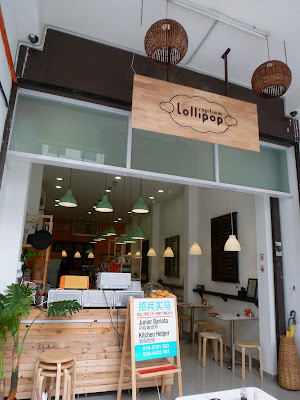Tucked in one of the many old shophouses of Campbell Street (Lebuh Campbell) is Lollipop Ropitiam. This eatery is the first expansion of Sungai Petani's Kafe Lollipop (糖糖饮茶中心), a popular kopitiam (traditional coffeehouse) in the neighboring state.
The name "Ropitiam" is an amalgam of the Malay words "roti" (bread) and "kopi" (coffee), which crudely describes the signature dishes here. Although Lollipop Ropitiam provides near-café ambience, the pricing is surprisingly affordable - similar to other nearly kopitiams.
The proprietor behind Lollipop Ropitiam is Mr. Gihong Wai (韦其宏), a nutritionist by profession who has mastered the science and art of producing naturally leavened bread. Unlike commercially-available baker's yeast, naturally leavened bread requires as long as 8 hours for the dough to ferment. This is because fermentation needs to start from scratch: from yeast spores, as opposed to cultivated yeast culture.
Naturally leavened bread requires the symbiotic action between two microorganisms: lactobacillus and wild yeast. The former is a bacteria which breaks down carbohydrates to lactic acid, creating an acidic environment in which wild yeast thrives. In the production of cheese, yogurt and sourdough bread, different strains of lactobacillus are also used.
The first dish is one that all Malaysians know and love: Roti Bakar Kaya & Butter (加央牛油烘面包, RM2.40). The bread is toasted to golden perfection, then kaya (coconut-egg cream) and butter are spread between two slices. Lollipop Ropitiam's kaya is made in-house and uses coconut milk, duck eggs and sugar as ingredients.
The thing that I like about the naturally leavened bread is the rough texture which gives excellent mouthfeel when chewed. Although soft and fluffy, normal white bread uses refined grains that do not produce this type of coarse texture. In addition, white bread has significantly less dietary fiber and minerals compared to naturally leavened bread.
Another way to enjoy naturally leavened bread is with eggs, such as a serving of Gong Ji Xia Dan (公鸡下蛋, RM4.40). Comically meaning "rooster lays eggs", a slice of thick slice of Benggali-style bread is topped with kaya spread and two half-boiled eggs. This is the perfect way to enjoy breakfast à la Malaysian style!
Next on the line is Polo Butter (牛油菠萝包, RM2.30), which consists of a sweet bun sandwich with butter in between halves. Commonly served as breakfast in Hong Kong and Macau, this bun has sugary crust on top which makes it particularly crispy and scrumptious.
Polo means "pineapple bun" in Cantonese. In reality, this bun has nothing to do with pineapples. Instead, the name refers to the crisscross pattern on the top which resembles the skin of pineapples.
As for drinks, Lollipop Ropitiam offers a full range of coffee ranging from traditional Kopi O (black coffee) to premium Hazelnut Latte. The choice today is Tik Tik Kopi (滴滴咖啡, RM3.30), which is served in a Vietnamese-style drip filter (cà phê phin). This drink carries a formidable dose of caffeine to knock anyone out of an afternoon slumber.
In additional to Asian coffee types, the eatery also has an espresso machine to prepare Western-style coffee. For example, one can enjoy a cup of single-shot Espresso (RM3.90) while enjoying bread. Nevertheless, I still prefer the traditional Asian-style coffee here.
If you enjoy the taste of naturally leavened bread at Lollipop Ropitiam and is interested to learn more, Mr. Wai has authored a recipe book (RM24.00) for this purpose. This bilingual book is a fine addition to your own cookbook library, or as a gift to a home-baking enthusiast.
Name: Lollipop Ropitiam
Address: 118, Lebuh Campbell, 10100 George Town, Pulau Pinang
Contact: 019-578-1093
Business hours: 8:00am-5:00pm, closed on Mondays
Website: https://www.facebook.com/LollipopBakery
Coordinates: 5.41832 N, 100.33334 E
Directions: From the Chinatown arch at the beginning of Campbell Street (Lebuh Campbell), walk or drive along this narrow one-way street for approximately 200 meters. Lollipop Ropitiam is located on the left before the intersection with Cintra Street (Lebuh Cintra). Street parking is available along Campbell Street and Cintra Street, but it may be difficult to find a parking spot during busy hours.











No comments:
Post a Comment